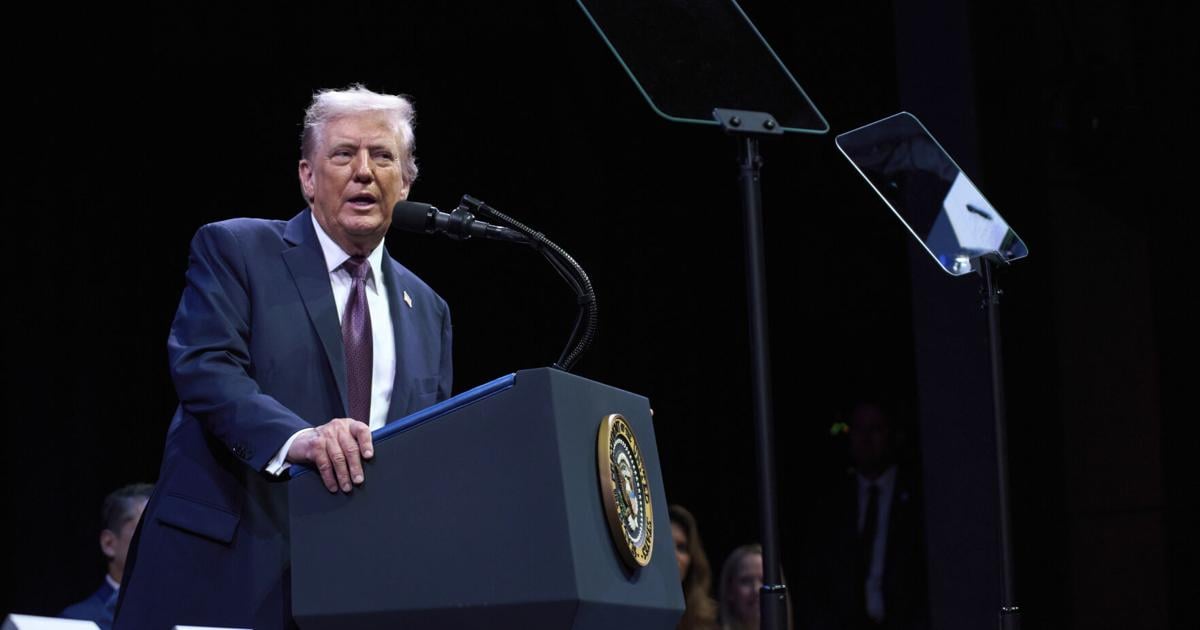Politics
Trump’s Travel Ban Disrupts Education Plans for Thousands of Students

The travel ban implemented by former President Donald Trump continues to hinder the aspirations of thousands of international students aiming to study in the United States. Many students, including those from Iran and Myanmar, have had their plans to attend U.S. colleges derailed due to increased visa restrictions affecting citizens from 19 countries.
One such student, Saghari, 21, invested years in English language training and earned an admission offer to study business administration at a private liberal arts college in Illinois. Despite her hopes for a fall arrival, her plans were disrupted by the travel ban. “You think that finally you are going to your dream, and then something came up and like, everything’s just gone,” Saghari expressed, reflecting the disillusionment shared by many.
The effects of the travel ban extend beyond individual dreams. According to the U.S. State Department, more than 5,700 F-1 and J-1 visas were issued between May and September of last year to individuals from the affected countries. Citizens of Iran and Myanmar received over half of these visas. Nevertheless, significant obstacles remain for students eager to pursue their education in the U.S., as delays in visa processing and heightened scrutiny have left many without options.
The situation is particularly dire for students like Pouya Karami, 17, from Shiraz, Iran. He had his sights set on studying polymer chemistry at Pittsburg State University in Kansas this fall but was forced to defer his admission until next year due to the travel ban. He remains hopeful, actively preparing for his embassy interview and reaching out to U.S. lawmakers in hopes of relaxing the restrictions on students.
The travel ban affects citizens from twelve countries, including those in Africa, Asia, the Middle East, and the Caribbean. While some individuals, such as green card holders and dual citizens, are exempt from the ban, the majority of citizens from the listed countries face substantial barriers to obtaining new visas. The administration justified the ban by citing national security concerns and high visa overstay rates, describing the screening processes of certain countries as “deficient.”
The impact is not limited to the students themselves; families have made profound sacrifices for their children’s futures. One student from Myanmar, who requested to be identified only as Gu Gu, shared that his family prioritized his education, saving diligently to support his aspirations to study at the University of South Florida. After receiving his acceptance letter, the family celebrated together. However, their enthusiasm quickly turned to despair when news of the travel ban emerged.
Gu Gu, now facing a grim reality in Myanmar, expressed his disappointment, noting, “I was all in for U.S., so this kind of breaks my heart.” Many young people in his country have either been conscripted into the military or have joined resistance movements following the military coup in 2021. Gu Gu had envisioned a life of educational freedom in the U.S., contrasting sharply with the turmoil at home.
With the path to the U.S. blocked, students are now exploring alternatives. Saghari postponed her visa interview in Pakistan, ultimately deciding to cancel it. After her request to defer her admission to Knox College was denied, she turned her attention to European universities. However, she faced additional hurdles, including requirements to retake an English proficiency exam due to an expired score. Currently, she has applied to a Polish university, awaiting confirmation while navigating the complexities of validating her high school degree.
For others, such as an Iranian researcher who chose to remain anonymous, the impact is equally profound. He was unable to travel to the U.S. for a position as a visiting scholar at the University of Pennsylvania. Instead, he continues his work in Tehran, lamenting the loss of a fully funded research opportunity. “You lose this idealistic view of the world,” he reflected, expressing frustration over the feeling of being unwelcome in a place he had hoped to thrive.
The consequences of the travel ban are far-reaching, affecting not just individual students but also families and communities. As they seek educational opportunities abroad, many are left grappling with uncertainty about their futures. The restrictive policies have caused a ripple effect, prompting students to reconsider their paths while holding onto the hope that change will eventually come.
As the situation evolves, students and their families continue to advocate for their rights to education. The future remains uncertain, but their resilience and determination to overcome these challenges is testament to their commitment to pursuing their dreams.
-

 Lifestyle3 months ago
Lifestyle3 months agoLibraries Challenge Rising E-Book Costs Amid Growing Demand
-

 Sports3 months ago
Sports3 months agoTyreek Hill Responds to Tua Tagovailoa’s Comments on Team Dynamics
-

 Sports3 months ago
Sports3 months agoLiverpool Secures Agreement to Sign Young Striker Will Wright
-

 Lifestyle3 months ago
Lifestyle3 months agoSave Your Split Tomatoes: Expert Tips for Gardeners
-

 Lifestyle3 months ago
Lifestyle3 months agoPrincess Beatrice’s Daughter Athena Joins Siblings at London Parade
-

 World3 months ago
World3 months agoWinter Storms Lash New South Wales with Snow, Flood Risks
-

 Science3 months ago
Science3 months agoTrump Administration Moves to Repeal Key Climate Regulation
-

 Science2 months ago
Science2 months agoSan Francisco Hosts Unique Contest to Identify “Performative Males”
-

 Business3 months ago
Business3 months agoSoFi Technologies Shares Slip 2% Following Insider Stock Sale
-

 Science3 months ago
Science3 months agoNew Tool Reveals Link Between Horse Coat Condition and Parasites
-

 Sports3 months ago
Sports3 months agoElon Musk Sculpture Travels From Utah to Yosemite National Park
-

 Science3 months ago
Science3 months agoNew Study Confirms Humans Transported Stonehenge Bluestones









